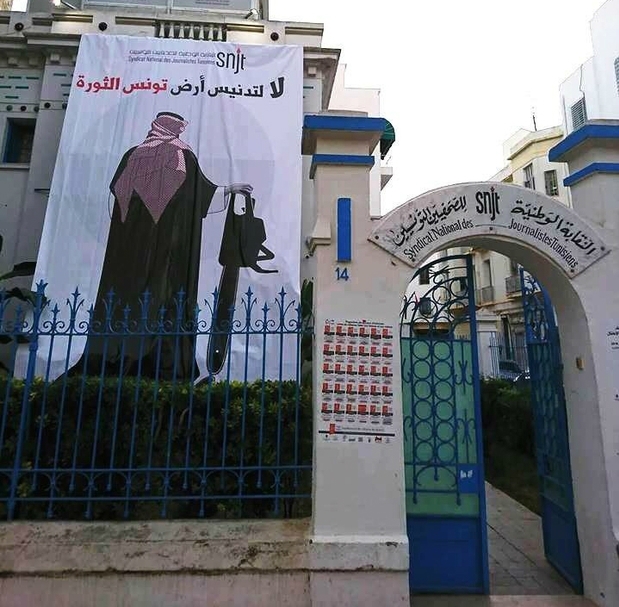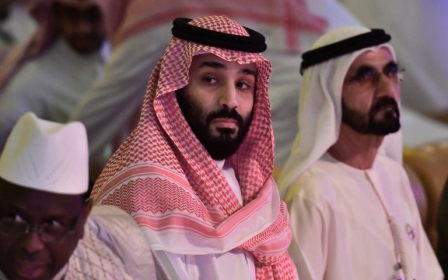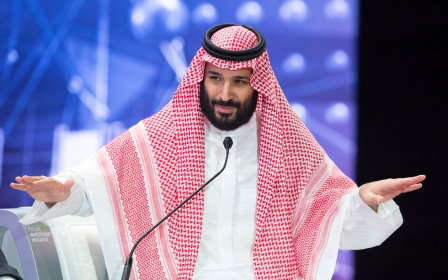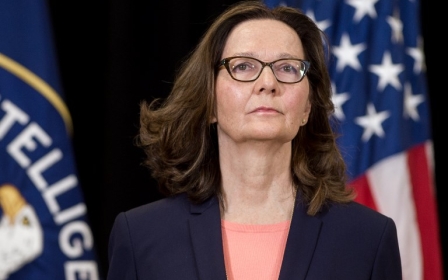Tunisians and Egyptians reject Saudi crown prince's ‘whitewashing’ tour

Tunisian and Egyptian activists and journalists have decried the Saudi crown prince's planned tour of their countries, dismissing the trip as an attempt to whitewash his image in the wake of Jamal Khashoggi's murder.
Mohammed bin Salman is set to touch down in Egypt on Monday before moving on to Tunisia the next day. Both countries have recent revolutionary history, overthrowing longtime autocrats Hosni Mubarak and Zine Abedine Ben Ali in 2011.
Now sections of their populations are taking aim at the 33-year-old heir to the Saudi throne, who has seen his popularity plummet following the murder of journalist Khashoggi by a death squad sent from Riyadh. Protests are expected in the Tunisian capital.
US media have reported that the CIA has concluded bin Salman was directly responsible for Khashoggi's death. He rejects the allegations.
In Tunis on Monday, Khashoggi's Tunisian counterparts showed their distaste at his assassination by unveiling a giant poster down the side of the National Syndicate of Tunisian Journalists' headquarters.
The poster showed the crown prince carrying a chainsaw, a reference to the way Khashoggi was dismembered by the Saudi hit men inside their consulate in Istanbul on 2 October.
On Friday the Tunisian presidency said the Saudi leader's visit was welcome.
"He is welcome in Tunisia, like the rest of the Arab brothers. Saudi Arabia has an important role in the Arab region," Nourredine Ben Ticha, an adviser to Tunisia's President Beji Caid Essebsi, said.
But this was a sentiment not shared by many Tunisians.
Under the title "No to polluting revolutionary Tunisia", Tunisian journalists and 12 civil society organisations held a press conference on Monday at the headquarters of the syndicate, condemning their government for hosting bin Salman, who they held responsible for Khashoggi’s death.
“The consulate should have been a safe refuge for any journalist, irrespective of their affiliation,” Sakina Abdel Samad, secretary-general of the syndicate, said at a news conference on Monday.
“We refuse to turn Tunisia into a destination to whitewash war crimes,” she said.
Meanwhile, dozens of Egyptian journalists signed a joint press statement on Monday calling for bin Salman to be subjected to an international tribunal.
They called the crown prince “the primary suspect in the murder of Khashoggi”, and denounced the Egyptian Journalists Syndicate’s silence over his planned visit to Egypt. Mohammed bin Salman is expected to be hosted by Egyptian President Abdel Fattah el-Sisi for talks on Monday.
Street action
Activists and lawyers in Tunisia have filed a number of legal complaints against bin Salman’s visit, but said they are not likely to stop the visit.
Lawyer Bashir al-Qatiti said in Monday's news conference that the legal complaints are “symbolic” and that street action is what matters.
Tunisian rights groups are set to stage a protest on Monday.
A group of activists online, who call themselves “Youth Against Mohammed bin Salman’s visit to Tunisia”, published a statement saying they have organised a protest in front of the Tunis's Municipal Theatre on Habib Bourguiba Street.
The statement called on activists to come together in solidarity and unite against oppression and dictatorship, by taking to the streets and expressing their dissatisfaction at the Saudi leader's visit.
In an open letter addressed to President Essebsi, the National Syndicate of Tunisian Journalists expressed its indignation, calling bin Salman a threat to security and peace in the region and the world.
And while street action is expected, the prince's impending touch-down already has social media in uproar.
Some questioned the timing of Mohammed bin Salman's tour, which he began by flying to the United Arab Emirates last week.
Commentators online asked why their countries were hosting the Saudi leader at a time when the international community has been increasingly critical of the Saudi government in the wake of Khashoggi’s murder and reports of abuses of activists in prison.
The official Saudi Press Agency reported last week that King Salman asked his chosen heir to embark on a regional tour "based on his keenness to deepen the kingdom's ties regionally and internationally”.
New MEE newsletter: Jerusalem Dispatch
Sign up to get the latest insights and analysis on Israel-Palestine, alongside Turkey Unpacked and other MEE newsletters
Middle East Eye delivers independent and unrivalled coverage and analysis of the Middle East, North Africa and beyond. To learn more about republishing this content and the associated fees, please fill out this form. More about MEE can be found here.




